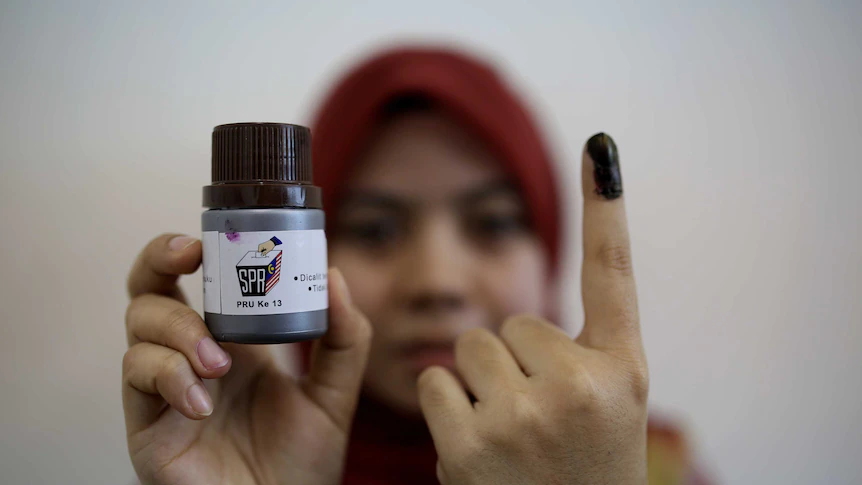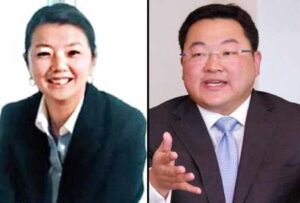By Sen Lam | ABC News

A local election commentator says Malaysia’s political landscape “will never be the same” after the polls on Sunday, no matter who wins.
Edmund Bon, Malaysian human rights lawyer and LoyarBurok blog contributor, has told Radio Australia’s Asia Pacific that fears about the integrity of the polling process persist.
Malaysia’s election commission is under fire for not acting more decisively about the reported failure of indelible ink to be used on voters’ fingers.
Allegations of planned fraud have been also levelled against the ruling Barisan Nasional coalition.
But Deputy Chairman of the Malaysian Election Commission Wan Ahmad Wan Omar has rejected the allegations.
BON: We have been warning of these allegations or these events for some time back, when Bersih raised these issues. So we heard about this for the first time on the internet, and I think these allegations (of phantom voters) are now being verified by NGOs. The unfortunate thing of course, is that the EC (Election Commission) has lost much of its credibility and whatever it says now, that it (BN govt) is not flying in these so-called foreign people, it’s really something that we cannot accept at face value. So it needs to verified, but resources are very thin on the ground, and I think the Opposition is trying to get the (flight) manifests and more details on that.
LAM: Has there been a response from the Election Commission of Malaysia?
BON: Ya, the Election Commission has said that they (the government) are not doing such things. It’s just a bare denial, but I think the Opposition has said that they have proof of manifests and some details. So we will have to wait and see. In fact, there’s news from the ground and even on Twitter, where Indonesians or Bangladeshis are saying to their friends, that they’re actually going to vote on the 5th of May, which is very shocking. And you don’t have ordinary Malaysians lying about it. There’s really no reason for them to tweet about it and lie about it. And as I read this on Twitter, it gets more and more depressing.
LAM: But how are we to know that these are not gremlins that were put there by agents provocateurs, if you like?
BON: Ya, I think a lot of these people we know from Twitter are our friends, and there is some credibility to what they say. And some of them are just ordinary people, who’re coming to vote for the first time, who have no interest – many of them are fence-sitters at the moment. So it’s very surprising that I’m reading about this and hearing about this.
LAM: What about this issue of indelible ink? Turns out that the ink might not be as indelible after all. Is that cause for concern?
BON: Definitely. I think the EC has tried to justify it in two ways. The first is that election officers did not shake the bottle, so the ink that was used does not have the proper “content” to be indelible. The second reason given is that if you use a magnifying glass, you can see that the ink has seeped into your finger nails. These are again reasons which just boggle the mind, because you don’t expect election officials who’re supposed to be trained in using the ink, not to know these things. And does it mean now, that every election officer has to have a magnifying glass to go through everybody’s fingernails?
LAM: With such suspicions and cynicism in the lead-up to Sunday, what do you make of Opposition assertions that if they lose, then there must be an element of fraud involved. Do you think such statements might make for a very tense atmosphere?
BON: It’s already very tense on the ground, I think, especially among the political parties. We’ve been going on the ceramahs (political gatherings) as NGOs and talking to different people, and we can see there’s a great amount of anticipation, especially for first-time voters on Sunday.
We hope that there’ll be no political violence. We’ve seen some instances. We hope that everybody will keep rational. But we do not know what will happen because this is probably the first time in our history that the ruling coalition is being challenged to this extent.
LAM: And Edmund, you mentioned “ceramahs”, the political gatherings they’re holding all over Malaysia during this campaigning period – and you’ve attended a few – indeed, given talks yourself. What impressed you most in what you’ve seen so far in the two weeks of campaigning?
BON: You’re seeing for the first time, a lot of young voters coming out, many first-time voters, fence-sitters. And the issues that we’ve been talking about, about removing ethnic identification from the registration forms, talking about civil and political rights, are really sinking in with them. And they’re coming not just to be part of the atmosphere, but they’re coming to really listen and get more information.
Apart from the usual political speeches they want to hear, they want to talk about it (the issues). And it’s very surprising, I think to see many, many people coming out. You have numbers from 500 onwards, almost every night, to 1,500 in small centres, and you can see of course in Johor, even in rural areas, people are coming out.
LAM: You wear many hats of course, and one of them, apart from being a human rights lawyer, is involvement in the voter awareness campaign, UNDI MALAYSIA, that’s one of the initiatives you were involved in. Looking at the past fortnight, do you think Malaysians are fully engaged in the political process?
BON: We’re more engaged in the process, and we definitely want more people to be politically aware. Unfortunately, our education system does not allow for that kind of awareness at an early age. But I think this is the first time you’ve seen people much more aware, due to a lot of different acts of dissent – Bersih (the campaign for free and fair elections), HINDRAF (Hindu rights group) rallies, that have ignited the imagination of the youth for a new Malaysia.
I come from a non-partisan position and I only speak about human rights issues – so we speak of issues like deaths in custody, we talk about corruption, income and inequalities – these are facts and these are matters which are very basic to everyone. We just simplify the messages – we say there’re problems with the Constitution where power is concentrated in only a few (members of the) elites. These are things that Malaysians want to hear, and they want to know how we can do things to change, and these barriers towards making Malaysia a more developed country.
LAM: What is the impression that you get from Malaysians – it’s been reported Malaysians are ready for change – but do you think Malaysians can sense change on the horizon, whether it’s under the BN or under the Pakatan Rakyat?
BON: I think the political landscape of Malaysia will never be the same again. It depends on who you speak to. Of course, the urban centres have always been talking about this change. And even if they don’t facts to back it up, they’re saying, you can’t have a monopoly of one party for fifty over years.
The rural areas are much more difficult to read because there’re a lot of cash handouts, a lot of different tactics and the education levels are a bit lower than in the urban centres. So these are the differences that we need to take into account.



